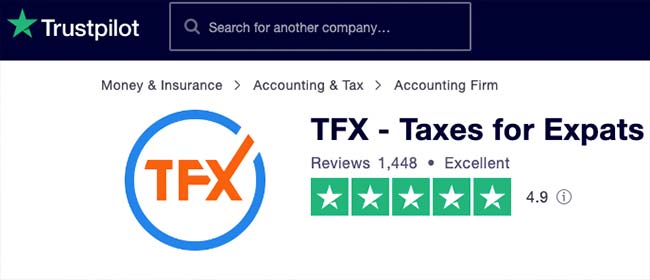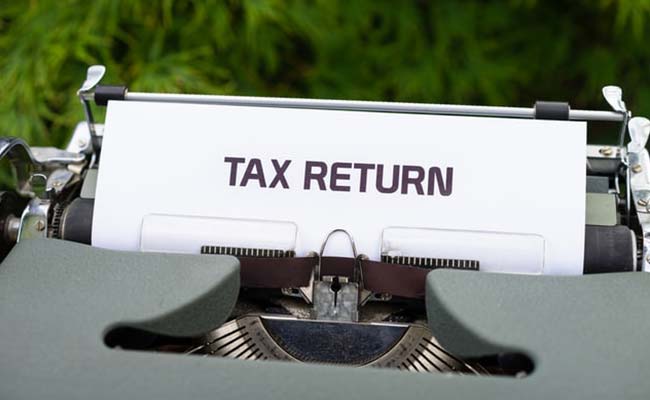The USA has strict filing requirements for Americans living abroad. If you earn some form of income, whether from inside or outside the U.S., The likelihood is that as a US citizen you will need to file a tax return.
Tax is rarely interesting or exciting, unless you're getting a rebate, but it's important to swot up on your liabilities, so that you don't fall foul of the law.
in this guide, I'll run through all you need to know about filing your U.S. tax return from Thailand.
From penalties to benefits and statute of limitations to state and federal tax returns, by the end of this post, you'll know exactly what you need to do.
Contents

1. Who Needs to File a U.S. Tax Return?
If you are a U.S. citizen or resident alien, you are required by law to report income from all sources within and outside of the U.S. There are some exceptions, see below, but generally, if you're earning money, you need to file.
Even if you don't end up paying any tax to the IRS, which many expats don't, the fact is, if you're an American expat in Thailand, you must complete a tax return to report your income.
2. Who Doesn't Need to File? (Minimum Requirements)
Depending on your filing status and age, you may not need to complete a tax return.
Here are the minimum requirements:
1. Single:
Under 65 – $12,400
65 or older – $14,050
2. Married Filing Separately:
Any age – $5
3. Head of Household:
Under 65 – $20,300
65 or older – $18,650
4. Married Filing Jointly:
Under 65 (both spouses) – $24,800
65 or older (one spouse) – $26,100
65 or older (both spouses) – $27,400
5. Qualifying Widow(er) with Dependent Children:
Under 65 -$24,800
65 or older -$26,100
6. Self-Employment:
Any – $400
It seems pretty straightforward, but even if your income bracket is below the minimum listed for your age group and status, if you fall into any of the following “special circumstances” categories, you'll still have to file a return.
Special Circumstances:
- You owe tax on a health savings account or a retirement plan
- You owe Alternative Minimum Tax
- You owe household employment taxes
- If you earned at least $108.28 in wages from a tax-exempt church or church-controlled organization
- If you received distributions from a Health Savings Account or an MSA
- If you are required to repay a 2008 Homebuyer Credit (or other recapture tax)
- If you owe Social Security/Medicare taxes on unreported income (tips)
Yes. It's quite a headache understanding all these different rules, which is why most American expats, even if they end up paying no tax, just file a return anyway, just to make sure they are covered.
Reasons to File Regardless of Status
You may be due a refund from a particular scheme, tax or otherwise, and to claim that refund you will need to file a return.
Additionally, if there's a possibility you may move back to the States in the future, you may not qualify for benefits such as a fuel tax credit if you haven't filed a return in the previous year.
Here is a list of reasons that may make it worth you filing:
- If you qualify for the First-Time Homebuyer Credit
- If you qualify for the Health Coverage Tax Credit
- If you have overpaid estimated tax
- If you qualify for a federal fuel tax credit
- If taxes were withheld from your pay
- If you qualify for the Earned Income Tax Credit
- If you qualify for the American Opportunity Credit
- If you have children and qualify for the Child Tax Credit
- If you adopted a child and qualify for the Adoption Tax Credit
- If you can claim the Credit for Prior Year Minimum Tax
3. State Vs. Federal Tax Returns
In addition to filing a federal tax return, if you can't prove residency elsewhere, or have specific ties to a state, you may also have to file a state tax return.
However, some residents are lucky enough to avoid this.
There are only 9 out of 50 states that don't require a state tax return. Those are as follows:
- Wyoming
- Washington
- Texas
- South Dakota
- Nevada
- Florida
- Alaska
These states do not collect state income tax from their residents, and this extends to expatriates from these states.
For those planning to live abroad, moving to one of these 9 states prior to your move would help you avoid the state tax return requirement. You should move 6-12 months before you want to leave the country.
In addition, Tennessee and New Hampshire only collect taxes on interest and dividends, so this also makes life a little more comfortable for expats from those two states.
The 4 Difficult States
If you're unlucky enough to live in one of the ‘difficult 4' – New Mexico, Virginia, South Carolina or Colorado – you're up against it. These States don't like the idea of a losing out on tax dollars when one of their residents escapes to live abroad.
When leaving these states, it is up to you to prove to the state that you will not be returning and therefore don't need to file a return, which won't be easy.
South Carolina and Colorado are the most diligent when it comes to linking ties that suggest future residency plans. If you have any of the following, it is unlikely you'll be able to escape the state tax return while living in Thailand:
- Voter registration
- Mailing address
- Property mortgage or lease
- State drivers license
- In state dependents
- Telephone and/or utility bills
- Library card
- Association memberships
- State investments or bank accounts
The 37 Neutral States
The remaining 37 states are referred to as neutral, in that if you have been living abroad for more than six months, it's fairly easy to be released from state tax liability – if you are able to prove residency overseas.
4. What Are the Penalties for Not Filing a U.S. Tax Return?
Fines vary and accrue in perpetuity, which, after 5 years, may more than double the original tax bill.
In addition, the US government has a number of laws in place that make it illegal to not declare foreign bank accounts.
The US government is also exploring the option of refusing to renew US passports in order for the IRS to claim billions in unpaid tax.
The long and short of it is, the US government knows that 8.7 million US citizens live abroad and approximately only 500k of those people file taxes abroad. With US debt rising, the IRS is stepping up efforts to collect unpaid tax.
There are approximately 40,000 American expats living in Thailand, and the large majority should be filling in a yearly return.
5. What If I Plan Never to Return to the USA?
This is the case for many expats in Thailand. Many work here, pay local taxes and have little interest in ever returning to the U.S. So why bother doing a return, let alone handing over money to a country that you take no benefit from – except the privilege of a US passport?
The thing is, that might be the case now, but what if you need to return to tend to a sick relative, or things change politically in Thailand and the country becomes unstable and you have to return. It's not unheard of elsewhere.
Or, on a happier note, you might want to visit the U.S. with your Thai spouse. To obtain a U.S visa for your spouse, you must submit copies of tax returns for the last 3 years.
Or perhaps you want to buy your half Thai child a house in the U.S.? Or maybe you will come into money and want to invest in the U.S. markets.
Is it really worth cutting all ties for the sake of doing a tax return?
If you are living in Thailand, or elsewhere abroad, and you want a trustworthy company to file your return, I recommend Taxes For Expats.
A number of my readers use them and they have an excellent rating on Trustpilot.
+ Get $25 off your return with this link

6. Is There a Statute of Limitations On Paying Tax?
There's a myth floating around that if you don't file for a certain number of years the IRS can't make a claim on your money.
Here's the reality check: There is no statute of limitations on unfiled tax returns. If you never file a tax return, the clock never starts counting on a limitation period, and therefore never runs out.
Let's face it, the government would never allow that loophole to exist.
7. Undeclared Foreign Bank Accounts
Many American expats have undeclared bank accounts, more often than not because they simply didn't know they had to declare them.
Don't worry, though, you have the opportunity to report these foreign accounts under either quiet disclosure or the Offshore Voluntary Disclosure Initiative.
However, whichever route you take, you must ensure all your tax returns are filed up to date.
8. Foreign Income Exclusion (FEIE)
After all that information you're probably feeling a little light-headed, so let's finish on a positive note. Depending on your income level and status, you may be able to claim a foreign income exclusion on your return.
If eligible, you may be able to exclude up to 100k on your return.
9. In Summary
This post covers most of what you need to know about filing a tax return to the IRS as a Thailand expat, and as you can see, U.S. tax law is quite a minefield. It seems Congress is a fan of making things as complicated as possible!
There's a lot to know, and a lot to get wrong. And the problem with making mistakes is that it can hit you in the pocket.
Not to mention that it's a real headache having to handle a tax return when you'd rather be lying on a lounger by the pool, or propped up at a bar with a nice cold beer.
If you'd rather someone else handle the pain of filing your U.S. tax return from Thailand, I recommend Taxes For Expats. It's a super easy service. You just fill out your details online and they handle the filing for you.
And, if you use my special link below, you'll get $25 off your return.
+ Click here to visit Taxes For Expats
Last Updated on


![Thailand's New Expat Income Tax Policy [Fact Checked by Experts] tax-expat-thailand](https://www.thethailandlife.com/wp-content/uploads/2023/10/tax-expat-thailand-150x150.jpg)
John Bouzin says
Great site.
I am planning on retiring in Thailand about a year or two, I am hoping you will be able to give me some guidance.
Do you know any expat or expat Facebook group where I can get some advise from US expats who may fall in this categories.
I am planning to retire with saving from pre-tax 401k at 60 years old, generate a monthly income from it, pay US taxes and later at 67 or 70 start collecting Social Security. I will not be working or generating any income in Thailand.
Looking for advise from someone who did something similar.
Thank you.
John
Apr 11, 2022 at 1:05 am
JamesE says
Waiting to start taking social security is like betting against the house at a casino. The gov't wants you to wait (that's why all their advice is to wait, not take it early) because their actuarial tables say that statistically you're gonna die so they'll have to pay out less money even though they'll be paying you more per month when you first start taking it. I don't have my spreadsheet I did the workup on anymore but the difference figuring living until I'm 84 was several tens of thousands of dollars in my favor. If you look at your annual SS letter showing the various benefits-at-age you can put something together pretty quickly.
Apr 11, 2022 at 5:30 am
John says
This very helpful, I did not take this into consideration, this is very insightful.
I will definitely look into this as a solution, the only issue is I am hoping to retire at 60 and won't be able to start drawing social security until 62.
I really appreciate it that you took the time to answer.
Thank you
John
Apr 12, 2022 at 6:46 am
JamesE says
Apr 12, 2022 at 10:37 pm
John says
maybe I will switch to leave on retirement money for two years, 60 to 62 and start SS at 62 and draw less from the 401K
Apr 14, 2022 at 6:20 am
Bubba says
Nov 03, 2021 at 5:39 pm
JamesE says
Sep 14, 2021 at 11:10 pm
Tony CPA says
Sep 14, 2021 at 4:33 pm
TheThailandLife says
Sep 14, 2021 at 6:54 pm
JamesE says
Sep 15, 2021 at 10:12 pm
TheThailandLife says
Sep 15, 2021 at 10:31 pm